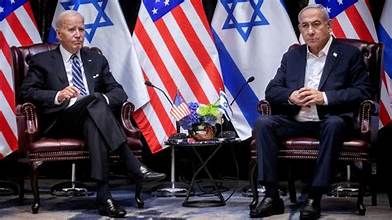Israel Opposition to Palestinian State:
Israeli Prime Minister Benjamin Netanyahu has clarified US that it opposes a Palestinian state in post-war scenarios.
During a news conference, Netanyahu vowed to continue the offensive until a “decisive victory over Hamas” is achieved. He communicated his stance on Palestinian statehood to US officials.
Netanyahu emphasized the need for Israel’s security control over all territory west of the Jordan River in any future arrangement.
He acknowledged that sometimes the prime minister must be capable of saying no to allies.
US Calls for Ceasefire:
The US vetoed UN resolutions for a ceasefire but urged Israel to lessen the intensity of its Gaza offensive. US National Security Adviser John Kirby clarified there would be no Gaza reoccupation post-war and reiterated the commitment to a two-state solution.
Following Netanyahu’s statement, US Department of State spokesperson Matthew Miller noted an opportunity for Israel to consider a Palestinian state.
Miller highlighted regional countries’ readiness to provide security assurances in support of the idea.
Establishment of Palestinian State is Pivotal:
The establishment of a Palestinian state is crucial for solving Israel’s long-term security challenges, according to a news briefing. The speaker emphasized that rebuilding Gaza, establishing governance, and ensuring security necessitate a Palestinian state. Despite differing opinions, the US reaffirmed its unwavering support for Israel.
Statehood for Palestinians:
Last week, US Secretary of State Antony Blinken concluded his Middle East visit. Blinken stated that providing Palestinians a route to statehood has the potential to stabilize the region. He also mentioned that this approach could contribute to isolating Iran.
Two Paths:
The US top diplomat outlined two paths for the region’s future. The first involves Israel’s integration with security commitments from regional countries, including the United States, and a pathway to a Palestinian state. The alternative path foresees continued terrorism, nihilism, and destruction by groups like Hamas, the Houthis, and Hezbollah, all backed by Iran.
Saudi Arabia Stance:
Earlier this week, Saudi Arabia’s foreign minister, Prince Faisal bin Farhan, expressed the belief that regional peace must include peace for Israel.
He stated that Saudi Arabia would “certainly” recognize Israel as part of a broader political agreement, contingent on peace for the Palestinians and the establishment of a Palestinian state.
Despite over 100 days of Israel’s Gaza war, ongoing attacks persist, resulting in at least 24,620 Palestinian casualties. Gaza is in its seventh day of a communication blackout, and raids continue in the occupied West Bank.
War in Middle East:
The war’s impact extends across the Middle East. Low-intensity clashes between the Israeli army and Hezbollah in Lebanon pose a risk of escalating into a full-scale war. Houthi rebels in Yemen persist in targeting international shipping. The US responds with attacks against the Houthi rebels.
















